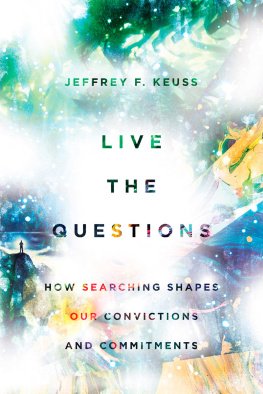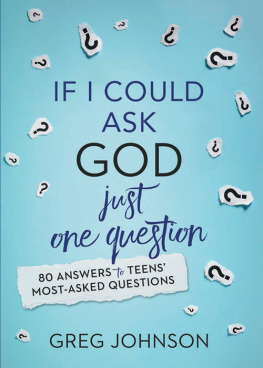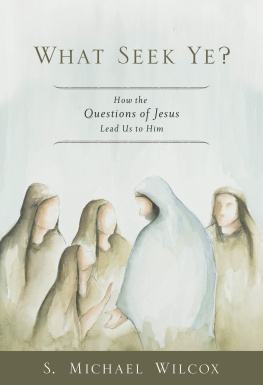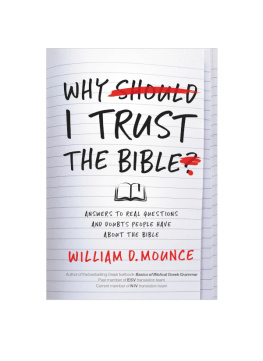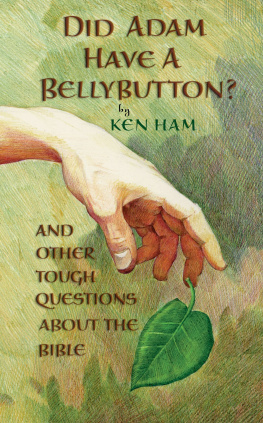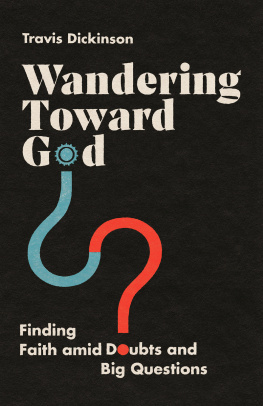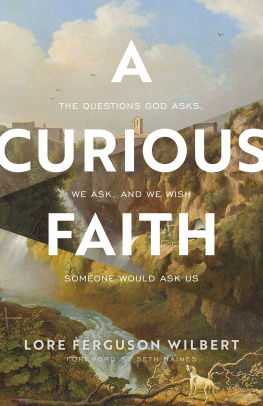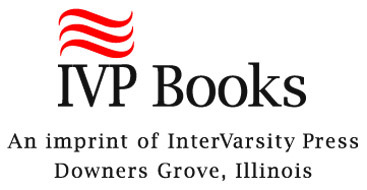Sommaire
Pagination de l'dition papier
Guide
JEFFREY F. KEUSS
LIVE
THE
QUESTIONS
HOW SEARCHING SHAPES
OUR CONVICTIONS
AND COMMITMENTS
InterVarsity Press
P.O. Box 1400, Downers Grove, IL 60515-1426
ivpress.com
2019 by Jeffrey F. Keuss
All rights reserved. No part of this book may be reproduced in any form without
written permission from InterVarsity Press.
InterVarsity Press is the book-publishing division of InterVarsity Christian Fellowship/USA, a
movement of students and faculty active on campus at hundreds of universities, colleges, and schools
of nursing in the United States of America, and a member movement of the International Fellowship
of Evangelical Students. For information about local and regional activities, visit intervarsity.org.
Scripture quotations, unless otherwise noted, are from the New Revised Standard Version of the Bible, copyright 1989 by the Division of Christian Education of the National Council of the Churches of Christ
in the USA. Used by permission. All rights reserved.
While any stories in this book are true, some names and identifying information may have been
changed to protect the privacy of individuals.
Cover design: David Fassett
Interior design: Daniel van Loon
Images: under water kelp forest: Tammy616 / E+ / Getty Images
abstract oil painting: photominus / iStock / Getty Images Plus
night sky watercolor: Khaneeros / iStock / Getty Images Plus
abstract floral background: andipantz / DigitalVision Vectors / Getty Images
dramatic coastline: shaunl / E+ / Getty Images
ISBN 978-0-8308-7093-6 (digital)
ISBN 978-0-8308-4565-1 (print)
This digital document has been produced by Nord Compo.
To Clara, Eilidh, and Miriam, who continually
challenge me to ask deep and abiding questions
that point toward faith, hope, and love.
And to Diana for showing us the breadth
and height of wisdom and grounding us
in the soil of confidence and confirmation
found in the truth of the gospel.
I want to beg you, as much as I can, dear sir, to be patient toward all that is unsolved in your heart and to try to love the questions themselves like locked rooms and like books that are written in a very foreign tongue. Do not now seek the answers, which cannot be given you because you would not be able to live them. And the point is, to live everything. Live the questions now. Perhaps you will then gradually, without noticing it, live along some distant day into the answer.
RAINIER MARIA RILKE
LETTERS TO A YOUNG POET
It is not about a return to the Bible. It is about resuming of the original biblical unity of life with the whole of our existence entangled in our time, with the whole weight of our late diversity on our souls, the unseizable matter of this historical hour undiminishedly present in our minds; it is about standing our present situations with biblical openness toward faith in dialogical responsibility.
MARTIN BUBER
MODERN MAN AND THE JEWISH BIBLE
We too often forget that Christian faith is a principle of questioning and struggle before it becomes a principle of certitude and peace. One has to doubt and reject everything else in order to believe firmly in Christ, and after one has begun to believe, ones faith itself must be tested and purified. Christianity is not merely a set of foregone conclusions.
THOMAS MERTON
CONJECTURES OF A GUILTY BYSTANDER
INTRODUCTION
The Power of Asking Good Questions
J ust give us the answer.
That was the response from one of my students in an evaluation of an undergraduate theology course I had just finished teaching.
The question: What was something you had hoped for in this class that you feel will help improve the course next time?
Ive been asking a version of this question for over thirty years as a way to gain input from each new generation of students. I like to take some of the more esoteric theological concepts involved in my courses and ground them in things that my students see as pertinent and immediate in the real lives they live every day. So at the end of each course, I ask them to tell me how I might make theology come alive for them. Most of the responses over the years havent been quite as succinct as this students one-line request, but some version of just give us the answer comes out at least once in almost every course I teach.
And who can blame my students? I get it. Many times I have sat in a lecture, a sermon, or watched a movie just like my students and wanted to fast-forward to the bullet points of conclusion, get to the plot twist, and then save myself the time of waiting so I can get on to the things that really matter to me and break my heart and the heart of others. Getting to the answer is often another way of saying get to the point that matters or why does this matter at all? Our world is a confusing, overwhelming place, perhaps now more than ever before, and our instant access to the pain and suffering around town and around the globe can become emotionally paralyzing.
This search for somethinganythingthat relieves the tension and despair of our age makes sense. This drive for answers is natural. Much of this book will address the form and reason by which we seek the answers in our life. In the search for answers to lifes difficulties and challenges, we can find ourselves turning to dogmatism, fundamentalism, and numerous other isms that close off further discovery, deep understanding, humility, and the connection with others that is the real source of much of our search for answers in the first place.
This is why faith is not merely certainty and conviction in a belief statement, although certainty and conviction do have a place in deep faith. To find the answers our heart and soul and body seek in this life will require more than objective answers. True answers that will sustain us for lifes journey require some messiness, mystery, wonder, and at times even uncertainty found in relationships with others and with God. The drive to separate answers from ongoing relationships with othersas if we can have meaning through mere conviction apart from faith that requires relationships and humilityis actually an ageless pursuit that fails time and time again.
In her masterpiece novel of the Victorian era titled Middlemarch, George Eliot introduces us to Rev. Dr. Edward Casaubon, a vicar of a small village in England who, rather than attend to the needs of his community, is driven to find what he terms is the Key to All Mythologies. This scholarly search is a quest to find the one great answer to lifes meaning and purpose, which he believes is located in the dusty books of antiquity. Focusing exclusively on the books before him, and not lifting his eyes and heart to see and hear the people God has given him to serve, is a metaphor for what George Eliot saw taking hold of society and church life throughout the nineteenth century.
As the Industrial Revolution was bringing with it the high value of speed, efficiency, and wealth as the mark of a healthy society, Eliot lamented the loss of what she called the mystery beneath the processesthe wonder, hope, passion, and humanity found underneath the fixed and certain objectivity that comes from rational answers devoid of relationships and humility. Casaubon was an extreme example of this quest for disembodied answers to the neglect of the flesh-and-bone life around him. Over the course of the novel he becomes fixated on his quest for the ultimate answers found in isolation and rationality to the point that he is left alone.

